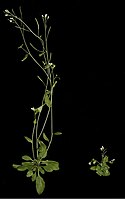
Photo from wikipedia
The phytohormone jasmonoyl-L-isoleucine (JA-Ile) regulates many stress responses and developmental processes in plants. A co-receptor complex formed by the F-box protein Coronatine Insensitive 1 (COI1) and a Jasmonate (JA) ZIM-domain… Click to show full abstract
The phytohormone jasmonoyl-L-isoleucine (JA-Ile) regulates many stress responses and developmental processes in plants. A co-receptor complex formed by the F-box protein Coronatine Insensitive 1 (COI1) and a Jasmonate (JA) ZIM-domain (JAZ) repressor perceives the hormone. JA-Ile antagonists are invaluable tools for exploring the role of JA-Ile in specific tissues and developmental stages, and for identifying regulatory processes of the signaling pathway. Using two complementary chemical screens, we identified three compounds that exhibit a robust inhibitory effect on both the hormone-mediated COI-JAZ interaction and degradation of JAZ1 and JAZ9 in vivo. One molecule, J4, also restrains specific JA-induced physiological responses in different angiosperm plants, including JA-mediated gene expression, growth inhibition, chlorophyll degradation, and anthocyanin accumulation. Interaction experiments with purified proteins indicate that J4 directly interferes with the formation of the Arabidopsis (Arabidopsis thaliana) COI1-JAZ complex otherwise induced by JA. The antagonistic effect of J4 on COI1-JAZ also occurs in the liverwort Marchantia polymorpha, suggesting the mode of action is conserved in land plants. Besides JA signaling, J4 works as an antagonist of the closely related auxin signaling pathway, preventing Transport Inhibitor Response1/Aux-indole-3-acetic acid interaction and auxin responses in planta, including hormone-mediated degradation of an auxin repressor, gene expression, and gravitropic response. However, J4 does not affect other hormonal pathways. Altogether, our results show that this dual antagonist competes with JA-Ile and auxin, preventing the formation of phylogenetically related receptor complexes. J4 may be a useful tool to dissect both the JA-Ile and auxin pathways in particular tissues and developmental stages since it reversibly inhibits these pathways.
Journal Title: Plant physiology
Year Published: 2021
Link to full text (if available)
Share on Social Media: Sign Up to like & get
recommendations!